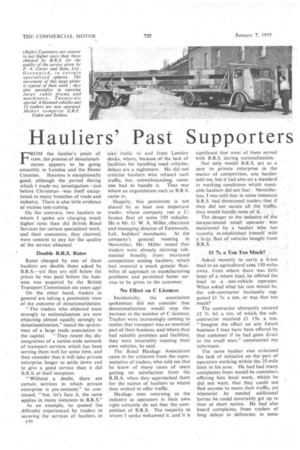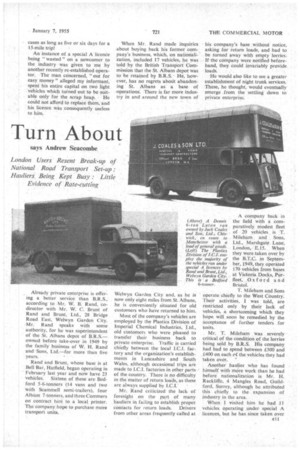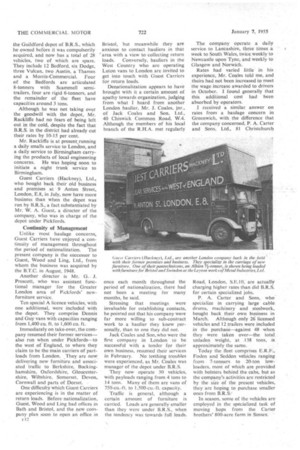Hauliers' Past Supporters Turn About
Page 50

Page 51

Page 52

If you've noticed an error in this article please click here to report it so we can fix it.
says Andrew Seacombe
London Users Resent Break-up of National Road Transport Set-up : Hauliers. Being Kept Busy. Little Evidence of Rate-cutting
FROM the haulier's point of view, the process of denationalization appears to be going smoothly in London and the Home
Counties. Business is exceptionally good, although the period during which I made my investigation—just before Christmas—was itself exceptional in many branches of trade and industry, There is also little evidence of vicious rate-cutting.
On the contrary, two hauliers to whom I spoke are charging much higher rates than did British Road Services for certain specialized work, and their customers, they claimed, were content to pay for the quality of the service obtained.
Double B.R.S. Rates Rates charged by one of these hauliers are double those asked by B.R,S.—yet they are still below the prices he was paid before his business was acquired by the British Transport Commission six years ago!
On the other hand, traders in general are taking a pessimistic view of the outcome of denationalization.
"The traders who objected most strongly to nationalization are now objecting almost equally strongly to denationalization," stated the spokesman of a large trade association in
the capital. "They resent the disintegration of a nation-wide network of transport services which has been serving them well for some time, and they consider that it wilt take prtvate enterprise longer to settle down and to give a good service than it did B.R.S. at their inception.
"Without a doubt, there are certain services in which private enterprise is pre-eminent," he continued, " but, let's face it, the same applies in many instances to B.R.S."
As an example, he quoted the difficulty experienced by traders in securing the services of hauliers. to cl0 take traffic to and froth London docks, where, because of the lack of -facilities for handling road .vehicles, delays are a nightmare. He did not criticize hauliers who refused such traffic, but, notwithstanding, someone had to handle it. That was where an organization such as B.R.S. came in.
Happily, this pessimism is not shared by at least one important trader, whose company run a C7 licence fleet of some 350 vehicles. He is Mr. G. W. A. Miller, chairman and managing director of Eastwoods, Ltd., builders' merchants. At the' company's general meeting in November, Mr. Miller stated that traders were already deriving substantial benefits from increased competition among hauliers, which had restored a much greater flexibility of approach to manufacturing problems and permitted better service to be given to the customer.
No Effect on C Licences Incidentally, the association spokesman did not consider that denationalization would stop the increase in the number of C licences. Traders were increasingly coming to realize that transport was an essential part of their business, and where they had suitable premises and facilities, they were invariably running their own vehicles, he said.
The Road Haulage Association came in for criticism from the representative of traders, who told me that he knew of many cases of users getting no satisfaction from the R.H.A. when they approached them for the names of hauliers to whom they wished to offer traffic.
Haulage men returning to the industry as operators in their own right certainly do not fear the competition of B.R.S. The majority to whom I spoke welcomed it, and it is
significant that most of them served with B.R.S. during nationalization.
Not only would B.R.S.act as a spur to private enterprise in the matter of competition, one haulier told me, but it had also set a standard in working conditions which reputable hauliers did not fear. Nevertheless, I was told that in some instances B.R.S. had threatened traders that if they did not secure all the traffic, they would handle none of it.
The danger to the industry of the 'inexperienced small operator was mentioned by a haulier who has recently re-established himself with a large fleet of vehicles bought from B.R.S. .
LI 7s. a Ton Too Much?,
Asked recently to carry a 6-ton load to an agricultural area 150 miles away, from where there was little hope of a return load, he offered the load to a. one-vehicle operator. When asked what his rate would be, the sub-contractor hesitantly suggested £1 7s. a ton, or was that too much?
The contractor ultimately secured 112 7s. 6d. a ton, of which the subcontractor received El 15s. a ton. "Imagine the effect on any future business I may have been offered by that customer if he had gone direct to the small man," commented my informant.
The same haulier also criticized the lack of initiative on the part of operators working within the 25-mile limit in his area. He had had many complaints from would-be customers offering him local work, which he did not want, that they could not find anyone to move their traffic, yet whenever he needed additional lorries he could invariably get up to four •at short notice. He had also heard complaints from traders of long delays in deliveries; in some cases as long as five or six days for a 15-mile trip!
An instance of a special A licence being " wasted " on a newcomer to the industry was given to me by another recently re-established operator. The man concerned, "out for easy money" alleged my informant, spent his entire capital on two light vehicles which turned out to be suitable only for the scrap heap. He could not afford to replace them, and his licence was consequently useless to him.
Already private enterprise is offering a better service than B.R.S., according to Mr. W. B. Rand, codirector with Mr. W. C. Brunt of Rand and Brunt, Ltd., 28 Bridge Road East, Welwyn Garden City. Mr. Rand speaks with some authority, for he was superintendent of the St. Albans depot of B.R.S.owned before take-over in 1949 by the family business of W. H. Rand and• Sons, Ltd.—for more than five years.
Rand and Brunt, whose base is at Bell Bar, Hatfield, began operating in February last year and now have 23 vehicles. Sixteen of these are Bedford 5-6-tonners (14 vans and two with Scammell semi-trailers), four Albion 7-ton ners, and three Commers on contract hire to a local printer. The company hope to purchase more transport units. When Mr. Rand made inquiries about buying back his former company's business, which, on nationalization, included 17 vehicles, he was told by the British Transport Commission that the St. Albans depot was to be retained by B.R.S.. He, however, has no regrets abotit abandoning St. Albans as a base of operations: There is far more industry in and around the new town of Welwyn Garden City and, as he is now only eight miles from St. Albans, he is conveniently situated for old customers who have returned to him.
Most of the company's vehicles are employed by the Plastics Division of Imperial Chemical Industries, Ltd., old customers who were pleased to transfer their business back to private enterprise. Traffic is carried chiefly between the local I.C.I. factory and the organization's establishments in Lancashire and South Wales, although occasional trips are made to I.C.T. factories in other parts of the country. There is no difficulty in the matter of return loads, as these are always supplied by I.C.L. , • Mr. Rand criticized the lack of foresight on the part of many hauliers in failing to establish proper contacts for return loads. Drivers from other areas frequently called at his company's base without notice, asking for return loads, and had to be turned away with empty lorries. If the company were notified beforehand, they could invariably provide loads.
He would also like to see a greater establishment of night trunk services. These, he thought, would eventually emerge from the settling down to private enterprise.
A company back in the field with a comparatively modest fleet of 20 vehicles is T.
Mileham and Sons, Ltd., Marshgate Lane, London, E.15. When they were taken over by the B.T.C. in September, 1949, they operated 170 vehicles from bases at Victoria Docks, Purfleet, Oxford and Bristol.
T. Mileham and Sons operate chiefly to the West Country. Their activities, I was told, are restricted only by their lack of vehicles, a shortcoming which they hope will soon be remedied by the acceptance of further tenders for units.
Mr. T. Mileham was severely critical of the condition of the lorries being sold by B.R.S. His company had had to spend between £.300 and £400 on each of the vehicles they had taken over.
Another haulier who has found himself with more work than he had before nationalization is Mr. H. Racklitre. 4 Mangles Road, Guildford, Surrey, although he attributed this chiefly to the expansion of industry in the area.
When I visited him he had 11 vehicles operating under special A licences, but he has since taken over cl 1 the Guildford depot of B.R.S., which he owned before it was compulsorily acquired, and now has a total of 28 vehicles, two of which are spare.
They include 12 Bedford, six Dodge, three Vulcan, two Austin, a Thames and a Morris-Commercial. Four of the Bedfords are articulated 8-tonners with Scammell semi trailers, four are rigid 6-tonners, and the remainder of the fleet have capacities around 3 tons.
Although he was not taking over the goodwill with the depot, Mr.
Rackliffe had no fears of being left Out in the cold, despite the fact that B.R.S. in the district had already cut their rates by 10-15 per cent.
Mr. Rackliffe is at present running a daily smalls service to London, and a daily service to Birmingham carry ing the products of local engineering concerns. He was hoping soon to initiate a night trunk service to Birmingham.
Guest Carriers (Hackney), Ltd., who bought back their old business and premises at 9 Anton Street, London, E.8, in July, now have more business than when the depot was run by B.R.S., a fact substantiated by Mr. W. A. Guest, a director of the company, who was in charge of the depot under Pickfords.
Continuity of Management Unlike most haulage concerns, Guest Carriers have enjoyed a con tinuity of management throughout the period of nationalization. The present company is the successor to Guest, Wood and Ling, Ltd., from whom the business was acquired by the B.T.C. in August, 1948.
Another director is Mr. G.. J. Prescott, who was assistant func tional manager • for the Greater London area of P;ckfords' newfurniture service.
Ten special A licence vehicles, with one additional, were included with the depot. They comprise Dennis and Guy vans with capacities ranging from 1,400 Cu. ft. to 1,600 cu. ft.
Immediately on take-over, the company resumed their former services— also run when under Pickfords—to the west of England, to where they claim to be the main carriers of partloads from London. They are now delivering new furniture and associ= ated traffic to Berkshire, Buckinghamshire, Oxfordshire, Gloucestershire, Wiltshire, Somerset, Devon, Cornwall and parts of Dorset. .
One difficulty which Guest Carriers are experiencing is in the matter of return loads. Before nationalization, Guest, Wood and Ling had offices in Bath and Bristol, and the new company plan soon to open an office in c12 Bristol, but meanwhile they are anxious to contact hauliers in that 'area with a view to-collecting return loads. Conversely, hauliers in the West Country who are operating Luton vans to London are invited to get into touch with Guest Carriers for return loads.
Denationalization appears to have brought with it a certain.amount of apathy towards organization, judging from what I heard from another London haulier, Mr. J. Coales, jnr., of Jack Coales and Son, Ltd., 40 Chiswick Common Road, W.4. Although the members of his local branch of the R.H.A. met regularly once each month throughout the period of nationalization, there had not been a meeting for many months, he said.
Stressing that meetings were invaluable for establishing contacts, he pointed out that his company were far more willing to sub-contract work to a haulier they knew personally, than to one they did not. .
Jack Coales and Son,who were the first company in London to be successful with a tender for their own business, resumed their services in February. No teething troubles were experienced, as Mr. Coales was manager of the depot under B.R.S.
They now operate 30 vehicles, with payloads ranging from 4 tons to 14 tons. Many of them are vans of 750-cu.-ft. to 1,500-cu.-ft. capacity.
Traffic is general, although a certain amount of furniture is carried. Loads are generally smaller than they were under B.R.S., when the tendency was towards full loads.
The company operate a daily service to Lancashire, three times week to South Wales; twice_ weekly to Newcastle upon Tyne, and weekly•to Glasgow and Norwich.
Rates had varied little in his experience, Mr. Coales told rne, and theirs had not been increased to meet the wage increase awarded to drivers in October. I found generally that this additional cost had been absorbed by operators.
I received a similar answer on rates from a haulage concern in Greenwich, with the difference that the company concerned, P. A. Carter and Sons, Ltd„ 81 Christchurch Road, London, S.E.10, are actually charging higher rates than did B.R.S. for certain specialized jobs,
P. A. Carter and Sons, who specialize in carrying large cable drums, machinery and steelwork, bought back their own business in March. Although only 26 licensed vehicles and 12 trailers were included in • the purchase—against 48 when they -were taken over—the total unladen weight, at .138 tons, is approximately the same.
Today the fleet comprises E.R.F., Foden and Seddon vehicles ranging from 7-boners to 20-ton lowloaders, most of which are provided with bolsters behind the cabs, but as the company's activities are restricted . by the size of the present vehicles, they are hoping to purchase smaller ones from B.R.S.'
In season, some of the vehicles are employed in the specialized task of moving hops from the Carter brothers' 800-acre farm in Sussex.
















































































































